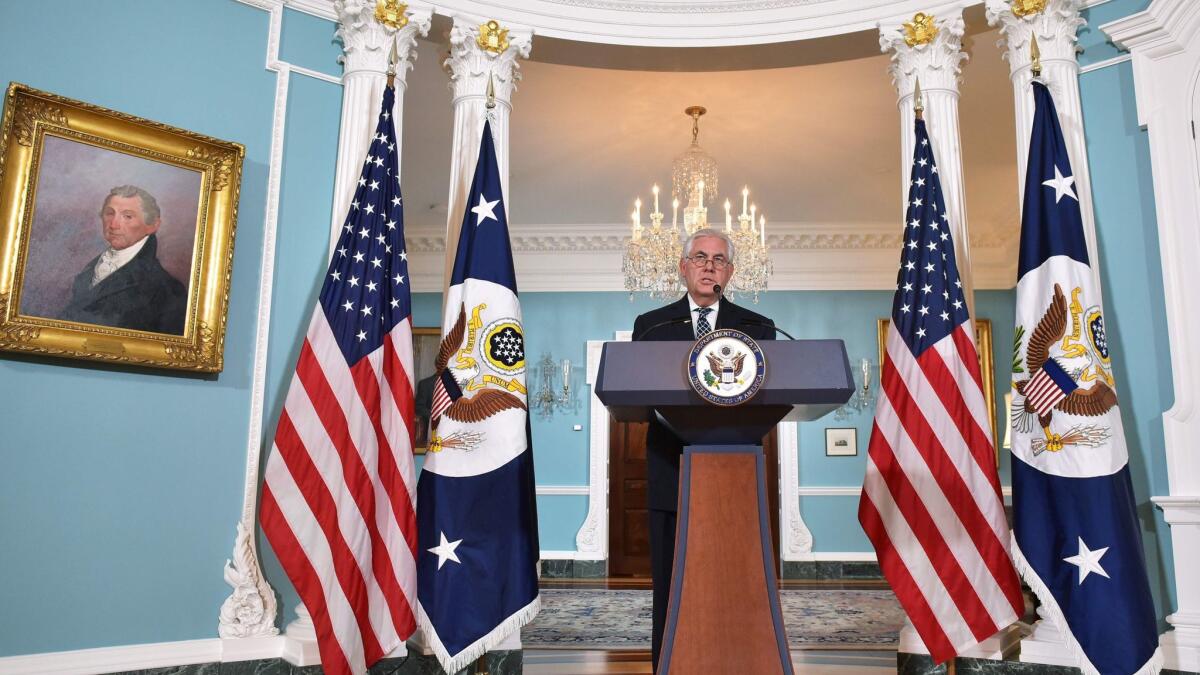Editorial: Trump’s incoherence on Iran doesn’t serve U.S. interests

- Share via
Since being elected, President Trump has reversed or softened a number of problematic positions he took during last year’s campaign. He has decided not to declare China a currency manipulator, he has not withdrawn the U.S. from the North American Free Trade Agreement — as he threatened to do if Canada and Mexico didn’t agree to “immediately” renegotiate its terms — and he hasn’t followed through with a promise to “dismantle the disastrous deal with Iran” that placed limits on that country’s nuclear program in exchange for relief from economic sanctions.
Yet on Iran, the president continues to send dangerously mixed signals that could jeopardize the nuclear agreement, divide the United States from its allies and embolden hard-liners in Iran. Trump is right to be concerned about Iran’s support for militant groups in Lebanon, Yemen and Afghanistan, and its insistence on testing ballistic missiles that potentially could be used to deliver nuclear weapons. But he can respond to those provocations without repudiating — or hinting that he will repudiate — an agreement that is as much in this country’s interest as it is Iran’s.
On April 18, Secretary of State Rex Tillerson sent a letter to Speaker of the House Paul D. Ryan informing Congress that Iran was complying with its obligations under the so-called Joint Comprehensive Plan of Action it negotiated in 2015 with the five permanent members of the United Nations Security Council, Germany and the European Union. The agreement requires Iran to dismantle much of the nuclear infrastructure it has assembled, provides for intrusive inspection of known nuclear sites and includes a mechanism for the re-imposition of sanctions in the case of Iranian violations.
Trump continues to send dangerously mixed signals that could jeopardize the nuclear agreement, divide the United States from its allies and embolden Iran.
But, reportedly at the behest of the White House, the letter had been revised to include language that seemed to cast doubt on the United States’ long-term commitment to the agreement. Tillerson noted that “Iran remains a leading state sponsor of terror through many platforms and methods.” Then, ominously, he said that “President Donald J. Trump has directed a National Security Council-led interagency review of the Joint Comprehensive Plan of Action (JCPOA) that will evaluate whether suspension of sanctions related to Iran pursuant to the JCPOA is vital to the national security interests of the United States.”
Tillerson has continued to sow doubt about U.S. commitment to the accord. At a State Department news conference, he complained that the agreement “fails to achieve the objective of a non-nuclear Iran” and only “delays their goal of becoming a nuclear state.” It’s true that many of the specific restrictions on Iran’s nuclear program are time-limited, but the architects of the agreement rightly believed that a significant delay in Iran’s ability to “break out” to achieve a nuclear weapon was preferable to no deal at all. That is still the view of America’s allies.
Trump himself has added to the confusion by asserting that the Iranians “are not living up to the spirit of the agreement.” Of course, Iran and the other signatories of the Joint Comprehensive Plan of Action (including the United States) are bound by the letter of the agreement, not by its “spirit,” which is open to any number of interpretations.
Trump’s, we assume, is that in exchange for the sanctions relief the agreement delivered, Iran would not only freeze certain aspects of its nuclear program and submit to inspections for a period of years but also would stop the testing of missiles that potentially could deliver nuclear weapons and, for good measure, reduce its support for nations and militias hostile to the West.
We agree with Trump that many of Iran’s actions are provocative and inimical to U.S. interests. (On the other hand, the Iranians are allies of the Iraqi government that is allied with the U.S. in seeking to “degrade and ultimately destroy” Islamic State.)
But the U.S. can take steps to discourage Iranian adventurism without calling into question the viability of the Joint Comprehensive Plan of Action or seeking to undermine it. Indeed, in February the Trump administration reacted to Iran’s testing of a medium-range ballistic missile by imposing new sanctions on 13 individuals and 12 other entities linked to the missile program.
The problem is that some in the administration, and in Congress, would like Trump to go further and punish Iran in ways that would violate the nuclear arms agreement. Perhaps Trump thinks that by floating the possibility that he will abandon the nuclear agreement he will induce Iran to alter its behavior on other fronts; if that’s his strategy, it’s a dangerous and divisive one. He needs to make it clear that, so long as Iran abides by the letter of the nuclear agreement, so will the United States.
Follow the Opinion section on Twitter @latimesopinion and Facebook
More to Read
A cure for the common opinion
Get thought-provoking perspectives with our weekly newsletter.
You may occasionally receive promotional content from the Los Angeles Times.









